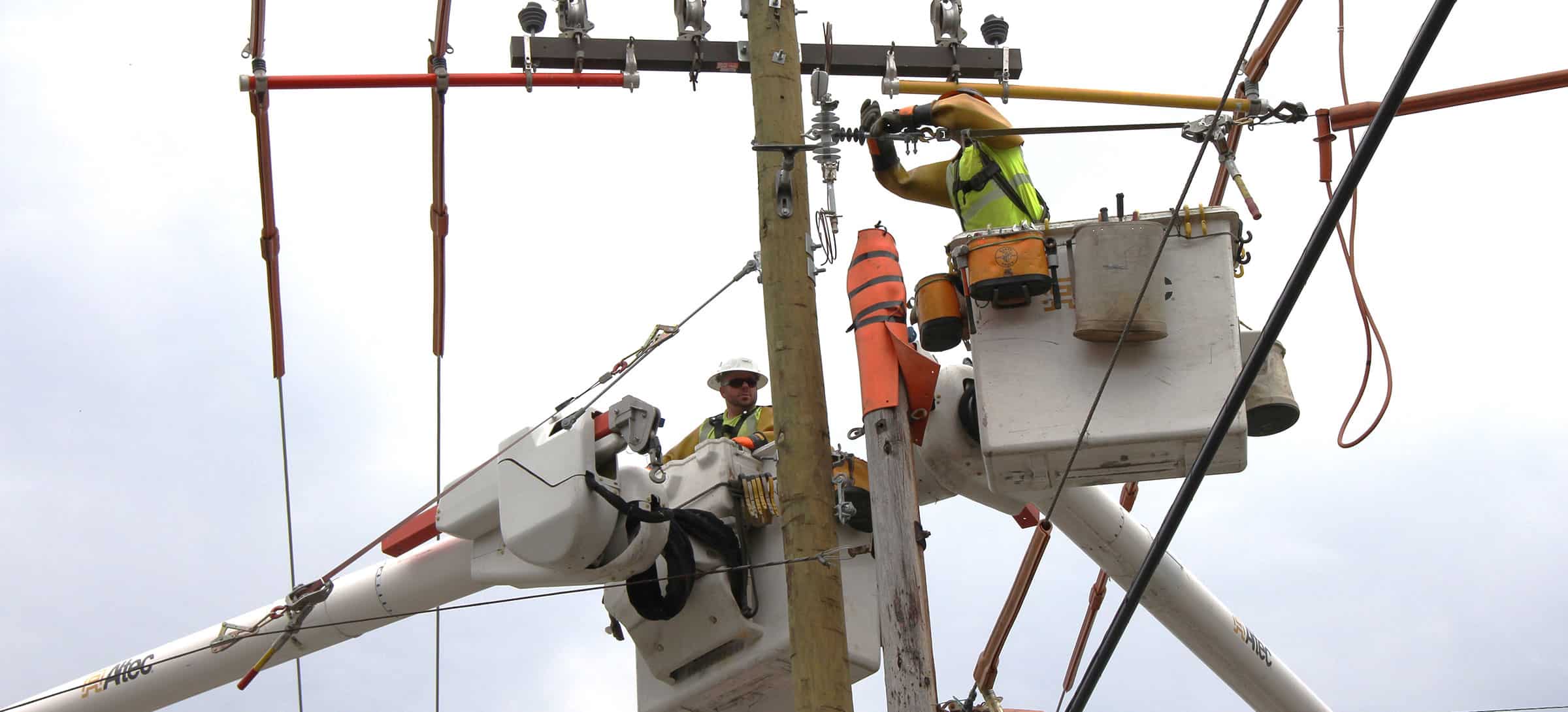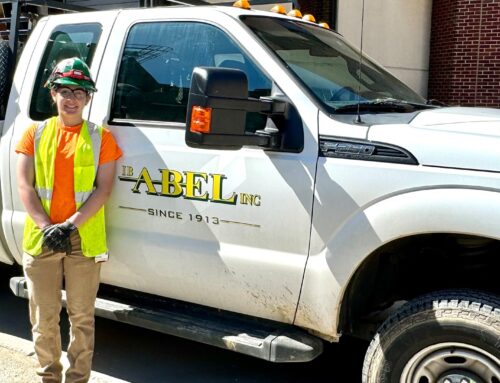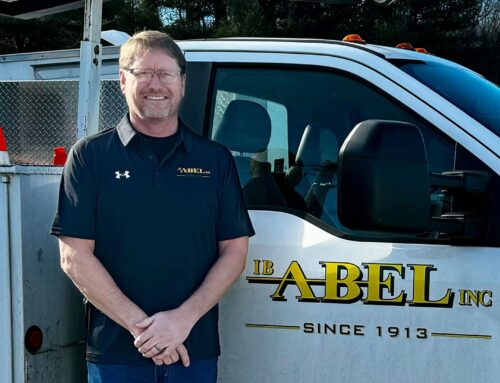A lineman’s hard work goes beyond electrical maintenance, repairs, and service for our electrical infrastructure. A lineman dedicates his or her time to keeping our lights on and power sources working efficiently, helping homes, buildings, and businesses (from hospitals and airports to warehouses and more) stay in working order. The effort and care that goes into maintaining the power infrastructure that spans overhead and underground electrical transmission lines, substations, and more may go largely unnoticed until the power goes out. Linemen who respond to those outages and issues are critical to the power supply industry. At I.B. Abel, we recognize these linemen—the ones on our team and on others’—as behind-the-scenes heroes and appreciate their dedication every day of the year.
To express our gratitude and spread awareness about this in-demand profession, we recently asked two of our valued lineworkers, General Foreman Shawn F. and Journeyman Lineman Paul K., to share insight on a typical workday, and what this role really entails for those who may be looking into utility lineman jobs and how to become a lineman.
What is a Day in the Life of an I.B. Abel Lineman Really Like?
Working as a lineman for an electrical contractor presents several paths, providing distinctly different workday experiences. Shawn’s daily work experiences vary quite a bit compared to Paul’s day-to-day on the job, as they each specialize in different service areas and work within different divisions at I.B. Abel. Shawn works on distribution projects, while Paul has been focused on substation construction and maintenance projects for the last few years. The work that both perform is equally essential for I.B. Abel’s clients and demonstrates how the lineman career path can be tailored to each individual’s strengths and interests. Shawn and Paul shared more about how they appreciate this aspect of the job, as it grants a level of freedom and flexibility while working proudly to serve their communities and fulfill a critical role that keeps our power turned on. They have chosen their individual specialties, and if they want to shift in the future, they can readily do so.
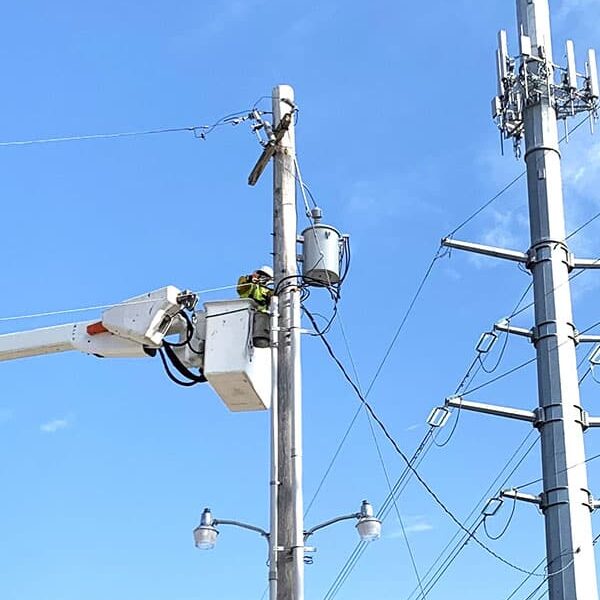
Shawn shared that a typical day for a lineman working on utility distribution projects is dynamic and starts with a morning briefing to establish the day’s plan. Because lineworkers can work in drastically different environments each day, as they move along power lines or even work on emergency storm support projects, this daily briefing among the crew is a key to success and crucial for keeping everyone safe. It also helps lead the team successfully in next steps, which can range from addressing traffic control to communicating effectively with customers or the public about any power-related concerns they could experience while electrical construction is underway.
“Linemen working on distribution projects are briefed on the tasks and locations they’ll be working in each day, ensuring everyone understands the work and associated hazards. This is especially important for less experienced crew members to be able to connect with foremen and others who can help support and mentor them so that everyone stays safe and projects are completed successfully.”
– Shawn F.
Journeyman linemen, no matter what types of projects they’re working on, face a multitude of unknowns and need to prioritize safety while ensuring the highest quality job completion and excellent service from start to finish. This approach upholds I.B. Abel’s deep commitment to safety and quality while performing the demanding yet essential work at hand.
While substation build-outs and substation maintenance projects are often more predictable in terms of the job site environment each day (established construction sites versus unpredictable working areas), Paul noted that risks remain ever-present, and the safety-first approach is always crucial. Construction sites tend to bring together crews from many different trades and companies, and that means linemen need to have excellent people skills to work safely together as a team and communicate about the power resources they’re integrating.
“Working with a variety of people in the trades, all with different personalities and roles, and being able to collaborate with crews from other contractors or subcontractors are important traits for linemen to have, especially if you want to progress to a journeyman foreman role or move into office-based management. A good work ethic and dedication to creating a safe work environment are also key.”
– Paul K.
At I.B. Abel, having excellent trade skills, experience, and training to continuously improve in the industry, a supportive team and an efficient and best-equipped fleet and tools for each job also play a key role in ensuring linemen can work confidently and perform services to an unmatched level of excellence.
“I.B. Abel always ensures we have the best people and equipment for every job we do. And we, as foremen and team members, are empowered to do what’s right no matter what. If that means stopping work to double-check something or get more equipment, leadership is always supportive. Our expertise and decision-making in the field or on the jobsite are never questioned, as our management team is confident in our expertise and commitment to safety and excellence.”
– Paul K.
Spotlight on Storm Restoration Work for Linemen
Storm restoration services are another critical focus of work that many linemen perform throughout their career journeys. Natural disasters, like hurricanes, winter ice storms, and even extreme heat events, can wreak havoc on electrical infrastructure, and it is lineworkers who are on the frontline in making repairs and getting the power back on in the aftermath. Shawn and Paul shared insight on why this work can be very exciting and how it often involves traveling to distant communities. It is also fulfilling, and the results of the work directly help people who may be going through some of the worst experiences in their lives.
“Storm repair work is extremely unpredictable. As a lineman, you know it’s your job to show up in these intense times of need to get electricity back on after an outage, heat back up and running after a winter storm, or hazards in residents’ backyards properly remedied. Sometimes, you will have to sacrifice time, or even holidays, with your family to respond to natural disasters and emergencies, but knowing that you’re performing the work needed for the power and safety of hundreds or thousands of other families is meaningful and rewarding in a big way.”
-Shawn F.
Choosing a Lineman Career Path & Joining an Empowered Team
Being a lineman at I.B. Abel is extremely rewarding and can provide unique opportunities outside of regular office jobs. The level of autonomy that our electrical linemen have can be rare in many other professions and is often a strong motivating factor for those seeking a career that offers both security and independence.
“I would recommend the lineworker career path at I.B. Abel to almost anyone. It offers stability in a supportive and safety-focused environment, and there are endless opportunities if you’re willing to learn from experienced mentors and follow best practices from your earliest days as a lineman apprentice.”
-Shawn F.
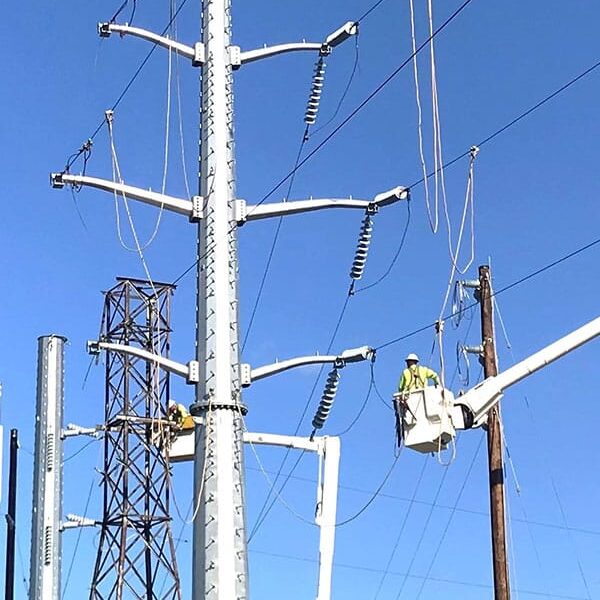
At I.B. Abel, we recognize that the hours or weeks can be long at times, especially in the storm restoration field, and that this role takes an extreme level of focus, caution, and communication to complete jobs well, on time, and safely. We express sincere gratitude for all that linemen sacrifice to keep things running smoothly for our valued clients and the communities in which we live, work, and play.
Want to join a team that provides ample opportunity to succeed? I.B. Abel offers a multitude of fulfilling career paths with boundless growth opportunities for professionals across the electrical construction industry. Visit our Careers page to view our currently available positions or learn more about how we remain committed to our culture of excellence, quality, and safety, investing in our people every step of the way since 1913.

